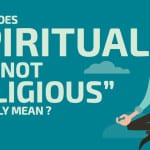Are You Religious?


Sometimes being religious is measured in degrees for the person asking (I.e. how much do you try to live your belief in God?) and sometimes it is a word used to distinguish those who believe in the supernatural but not in organized religion from those who believe in both (religious). I am cautious to accept these two paths as acceptable for a few of the reasons below.
I know you all were sitting on the edge of your seat waiting, as you most of you know, the answer is that I am “religious” person, or a person who believes in God and strives to live according to the belief that this God revealed himself.
It would be useful to look at the word religion, which in its Latin root, simply means practice by reading over of belief by review what has been given to you, or showing respect for the God(s). In fact, in the three major religions of Christianity, Islam and Judaism, ‘religion’ is actually a virtue or characteristic of acting according to a belief (in this case, what a human owes God — that is — traditionally, not just belief in his existence, but fulfilling his expectations and in the Christian tradition, having a relationship with him.)
It is in this sense that a person, or I, can be more or less religious. However, this is different from the question that the person is usually asking which is “How much do you believe your religion?” What’s the difference? If a person already knows that you are a certain religion – Jewish, Muslim Catholic etc, and they still ask the question, they are asking something that shouldn’t make sense…why you would believe a religious claim and not act fully according to the degree they believe it? Of course many people do, but it does not make sense to do so — it is less than ideal. It is like you believing you have the capability and should build a rocket to reach the moon, and responding to a person asking you if you will do it… “I’m halfway going to do it.” The question should instead be “How much do you believe what you say you do and how much do you intend to act according to it?”
The second meaning of the question could be whether or not your believe in “organized religion” (see the link for a clip), as 
opposed to just being ’spiritual’. The irony here in this question is quite strong. Let’s say organized religion means people who believe the same thing, get together and live according to that belief. Naturally they want to live together and so form a community. Every community has its leaders whether official or not and someone will be passing on to the children the belief in non organized religion. Its about as non-organized as a non-denominational will be after it grows and opens up a few other child-locations. Being spiritual without identifying with any particular religion is completely intelligible, but as soon as a second person believes the same thing you do, even if that is non-belief in ‘official leaders’ or divine revelation you start to all act according to that belief. Atheists do certain actions that correspond with the belief that God doesn’t exist. Buhddists do certain actions that correspond with the struggle for nirvana. Catholics do certain actions as well. Dare I say it, spiritual people also act according to their beliefs which is usually based on a little of the supernatural in different ways and so too have their own, albeit atomized, religions. This is because religion is merely practicing a supernatural belief. It makes no sense to speak of spiritual but not religious. The older religions themselves claim not to be about the ‘administration’ that has developed to support it, but about the belief. If this is true, then aren’t their ‘members’ just participating in a different degree of ‘practicing’?
This is why, to me, it makes no sense for someone to really actually believe that God is present in the Eucharist, or that God is present in the harmony of the material of the universe and desires peace, but to not see a need to live according to that belief — or be religious. You either live according to a supernatural belief or not. Or, In short, you are either religious (practicing) or you are not. The sides of “I believe but don’t practice” or “I practice but don’t believe” lack an equal amount of sense.
 Just as those who merely act according to their religion without believing it, believing you are spiritual without acting according to that new form of religion is equally odd. It also seems rare that a person asking “Are you religious?” means to ask “Do you practice the virtue of living according to what you believe God wants for you?” Often what they mean to ask is “How much do you care about the demands of your belief in the supernatural.” Naturally, the answer should be: “A lot”.
Just as those who merely act according to their religion without believing it, believing you are spiritual without acting according to that new form of religion is equally odd. It also seems rare that a person asking “Are you religious?” means to ask “Do you practice the virtue of living according to what you believe God wants for you?” Often what they mean to ask is “How much do you care about the demands of your belief in the supernatural.” Naturally, the answer should be: “A lot”.
So there’s my two cents, take it or leave it or your opinion.




Comments